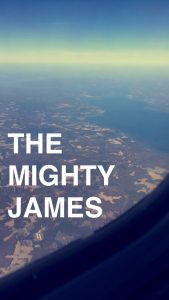Synthetic Post #2
I’ve always loved flying. While my little sister was the nervous traveler and my brother was indifferent, I was the kid who my parents could rely on to pick a fight over the window seat no matter how many times I was told to be the “mature, big sister.” My need for the window seat goes beyond being ideal for nap taking and propping your feet up against the wall when the seat in front of you is lacking a foot rest.
Even on ground level, I’m bothered if I can’t identify my location on a map. This is even more so true in the air, where it never ceases to amaze me how the landmarks I can see from 40,000 feet are nearly identical to, albeit a tad larger than, the shapes on the map hanging on my wall. Thus, the window seat makes all the difference, because above easy access to the bathroom I prioritize looking out the window and keeping track of what city or state we’re flying over.
I’d gotten pretty good at the flight from Richmond to Boston and vice-versa, but before Geo James I was only capable of a basic interaction with the land I was looking down upon. I deduced where we were based upon recognizable skylines and uniquely shaped inlets and peninsulas. On my most recent trip home however, I noticed every river we flew over (first the James, then the York, the Rappahannock, and so on up the East Coast) and knew that a city shouldn’t be too far off. I saw the Chesapeake Bay and wondered if any of the trash we cleaned up from Belle Isle would have ended up there yet. No matter how hard I squinted I couldn’t tell if there were tires buried in the riverbed but was nevertheless comforted knowing that due to our efforts that at least the James is slightly more Tire-less.
This is just one example of the enhanced perspective GeoJames has given me on the world around me and a way the class has given meaning to the term “living and learning community”. The value in the “living” part is in encouraging what you learn to impact the way you live and allowing your lived experience to enhance your learning.
From reading my classmates’ blog posts throughout the semester, I’ve seen that I’m not the only one to notice such concrete effects. McKenzie has allowed the curriculum to increase her (hesitant) love of green space. Andrew noted that after “elite training as a member of Earth Lodge” we “notice more than most” in the nature around campus.
Because the “living” aspect of class has been so essential to our understanding of and commitment to the class’s purpose, such understanding was not so clear at the beginning of the semester. Both Sanitra and Parr recognized this in their blog posts.
Our first introduction to the curriculum was the summer reading – Portlandness and Forest Under Story.
When discussing the Portlandness atlas, I remember finding relevant that the authors chose to introduce Portland as a Cascading City in favor of a more stereotypical or commonly known descriptor. In my summer reading blog post, I wrote that this was because “they didn’t want their Atlas to simply reinforce preconceived notions of Portland but instead give honest insight into the “Portlandness” experienced by the city’s everyday inhabitants.”
I think the same can be said of this class, which framed geography in terms of a watershed, a new term for the majority of the class (as was evidenced by our need to define it every day of the trip and biweekly at the beginning of the semester). Although it may have presented some confusion upfront, it opened the door for all of us to conceptualize the campus, city, and planet in this new way – as a watershed, otherwise known as “any area of land from which water and materials drain to a common point, such as a stream, river, pond, lake or ocean.” (Thanks for the reminder, Sanitra).
This class also asked more of us than others. We were asked to form a community with each other and use that community to both enhance our learning experience inside the classroom and find relevancy for the curriculum outside the confines of Gray classroom. As Quinn eloquently summarized, I would argue that our SSIR has been able to do so effectively.
To evidence this, I present the snapchat I sent to many members of Earth Lodge from a plane, in which I mistakenly identified the York River as “The Mighty James” (which is really besides the point, but I feel obligated to admit). Even though I identified the river on my own and found satisfaction in doing so, I appreciated that validation of my excitement by my likeminded and like-passioned friends, who could relate to my identification excitement as only tree-test veterans can. Without the “living” to supplement the “learning,” this may not have been the case.

